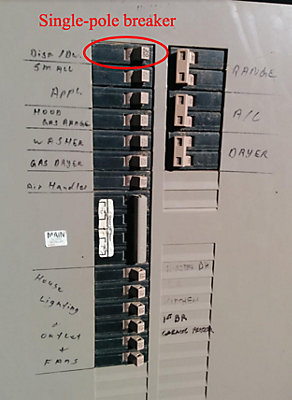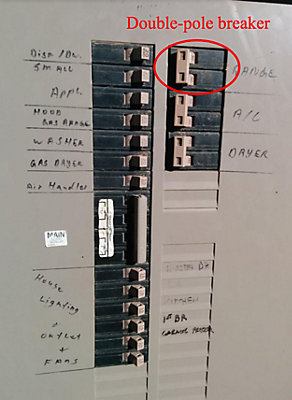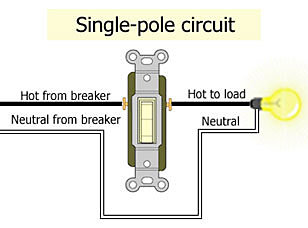What’s The Difference Between A Single And A Double-Pole Breaker?

May 10, 2023
If you’ve ever taken a peek at your home’s main circuit panel, you’ve probably noticed 2 different kinds of breakers: Single pole breakers and double pole breakers.
But what’s the difference between the two?
Well, single-pole breakers and double-pole breakers differ in the voltage and amperage they provide as well as how they are wired.
- Single-pole breakers: Provide 120 volts, 15-20 amps and have one hot wire and one neutral wire.
- Double-pole breakers: Provide 240 volts, 20-60 amps and have two hot wires that share one neutral wire.
We’ll take a closer look at the differences between each of these breakers and discuss when you should use one over the other.
Single-pole breakers
Single-pole breakers are the narrow switches located on your home’s electrical panel.

Appliances/circuits they’re used for:
- General lighting outlets
- Fans
- Curling irons/hair dryers
- Vacuums
- Outdoor lighting
- Power tools
- Air compressors
How they’re wired:
Single-pole breakers are wired with one hot wire and one neutral wire. When there is an overload in a single-pole breaker’s circuit, only that particular breaker trips.
Double-pole breakers
A double pole breaker is generally twice as wide as a single pole breaker. This is because a double pole breaker is essentially two single pole breakers that are mechanically linked together.

Appliances/circuits they’re used for:
- Central air conditioners
- Electric dryers
- Electric ranges
- Electric water heaters
Note: While an entire double-pole breaker can be dedicated to the above appliances, double-pole breakers can also serve lower-voltage circuits/appliances (see explanation below).

How they’re wired:
Double-pole breakers have two hot wires that are connected by a single neutral wire. That means if there’s a short circuit on either of the poles’ hot wires, both trip.
These breakers can be used to serve two separate 120-volt circuits or they can serve a single 240-volt circuit, such as your central AC’s circuit.
Have questions about your home’s electrical panel? Ask a Florida electrician
Need to replace a breaker or have general questions about your Florida home’s electrical system?
Just contact us. Our electricians are here to help. We have locations in Sarasota, Tampa, Orlando and Naples and serve the surrounding areas.
Posted in: Tips